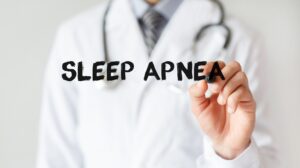 More than 20 million Americans suffer from sleep apnea, but an alarming 80% of cases are undiagnosed. Obstructive sleep apnea (OSA) is the most prevalent type of the breathing disorder. OSA is often associated with loud, chronic snoring and poor sleep quality; however, the risks of untreated sleep apnea are far more severe. Not only can you be at risk of a shorter life expectancy, but untreated OSA may even cost you your eyesight. Here’s what you need to know about sleep apnea and blindness.
More than 20 million Americans suffer from sleep apnea, but an alarming 80% of cases are undiagnosed. Obstructive sleep apnea (OSA) is the most prevalent type of the breathing disorder. OSA is often associated with loud, chronic snoring and poor sleep quality; however, the risks of untreated sleep apnea are far more severe. Not only can you be at risk of a shorter life expectancy, but untreated OSA may even cost you your eyesight. Here’s what you need to know about sleep apnea and blindness.
What is Sleep Apnea?
Obstructive sleep apnea occurs when there are frequent breathing disturbances from an obstruction created by the soft tissues in the back of your mouth or your tongue. As your muscles relax when sleeping, they can block your upper airway, causing you to stop breathing several times throughout the night.
Each event can potentially last for a minute or longer, depriving your body of oxygen. This can affect your health negatively over time. You can have an increased risk of several physical and psychological conditions. Every time you stop breathing, it will also interrupt your sleep cycle, which can lead to sleep deprivation. You can be at an increased risk of fatal auto accidents from drowsy driving. Researchers have also found that sleep apnea may also affect your eyesight.
Link Between Sleep Apnea and Blindness
Although sleep apnea involves your upper airway, it can affect your health in many ways. Glaucoma and dry eye are two conditions that have been linked to sleep apnea.
A CPAP machine is the most traditional method of treating sleep apnea. Steady air pressure is delivered through facial masking to prevent breathing disruptions. If a mask leaks, it can cause constant airflow to the eyes, which can cause swelling, dryness, and irritation.
Besides CPAP irritation, people with sleep apnea are 10 times more likely to develop glaucoma. Drops in blood oxygen levels lead to the degradation of the optic nerve, which can potentially cause glaucoma.
Protect Your Eyesight with an Oral Appliance
An oral appliance is an effective treatment for mild-to-moderate obstructive sleep apnea. A custom-fit device trains your jaw and tongue to rest in better positions to keep your airway open. It can replace needing a CPAP to avoid eye irritation. An oral appliance can provide over a 95% improvement in sleep apnea symptoms to protect your eye health and wellness.
In addition to complying with your treatment plan, schedule regular eye appointments to monitor for any changes.
About Dr. Billie Reeder
Dr. Reeder worked as a dental assistant before studying dental hygiene at Oklahoma State University. She achieved her dental degree at the University of Oklahoma Health Science Center and has completed advanced training in sleep apnea. Dr. Reeder provides high-quality oral appliances to treat snoring and sleep apnea. Request an appointment through her website or call her office at (918) 417-1926 to see if an oral appliance is right for you.
